32nd Annual National Conference for History Education Conference
virtual
March 17, 2022
In 1848’s The Women of the American Revolution, author Elizabeth Ellet wrote: “Except for the Letters of Mrs. Adams, no fair exponent of the feelings and trials of the women of the Revolution [has] been given … showing the important part she bore … to which we are not less indebted for national freedom, than to the swords of our patriots who poured out their blood,” yet the story of our “Revolutionary Mothers” includes many—often conflicting—struggles for freedom and independence. This session, featuring a lesson created for the ARI by master teacher Kim Greer, and the insight of Rachel Nellis, Research Services Librarian, explores how the Revolutionary generation’s female community supported or resisted the War economically, politically, and militarily.

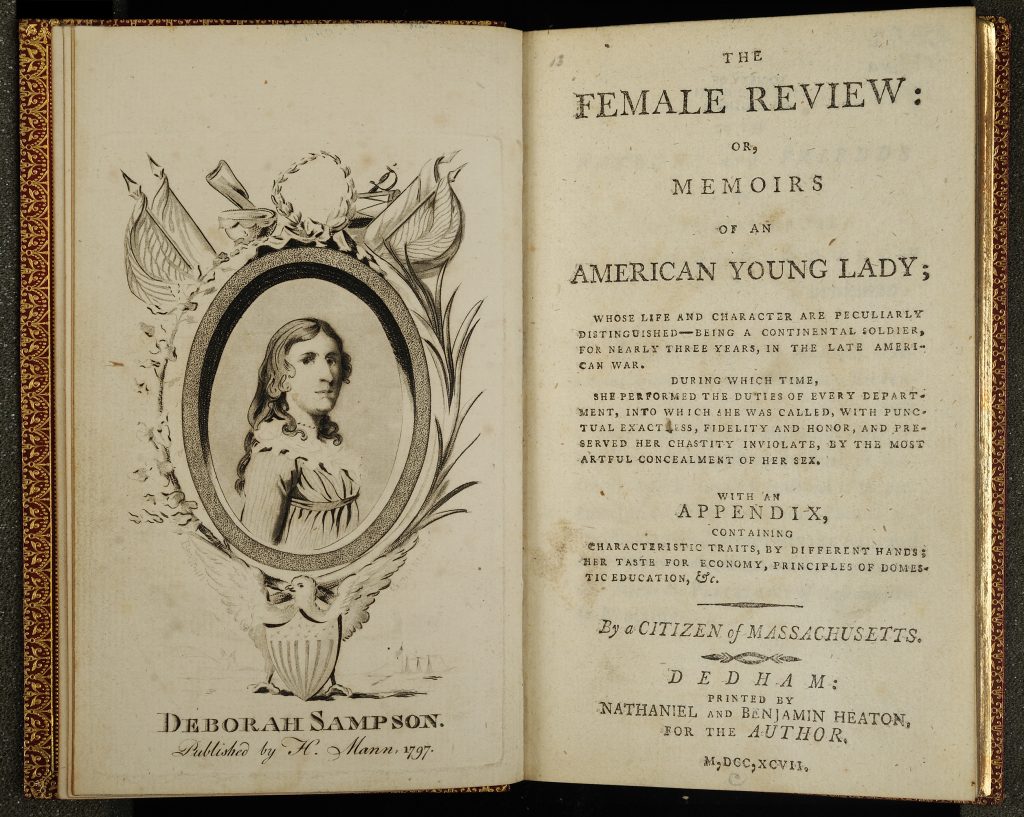
The Female Review: or, Memoirs of an American Young Lady
“A Citizen of Massachusetts” [Herman Mann]
Dedham, Mass.: Nathaniel and Benjamin Heaton, for the Author, 1797The Society of the Cincinnati, The Robert Charles Lawrence Fergusson Collection
Deborah Sampson (1760-1827) enlisted in the Massachusetts Continental Line in May 1782 using the name “Robert Shurtleff.” Mixing fact with romantic inventions, this imaginative account of Sampson’s wartime service was published to support her case for a pension. In 1805 she received a disability pension of $4 a month, which she relinquished to accept a pension of $8 a month awarded under the Pension Act of 1818.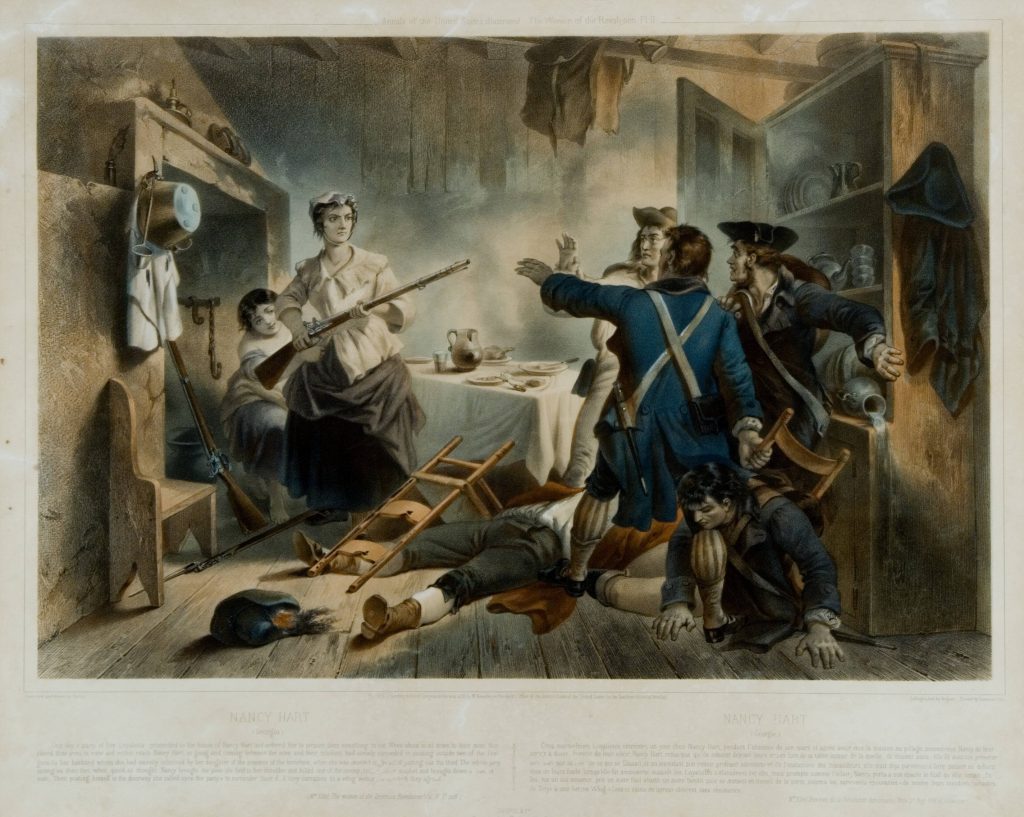
Nancy Hart
Felix Darley, artist, Charles Regnier, egraver
New York: Goupil & Co., 1853The Society of the Cincinnati, The Robert Charles Lawrence Fergusson Collection
The life and legend of Nancy Hart embodies the violent struggle between patriot and loyalist neighbors that characterized the American Revolution in the Georgia backcountry. This 19th century color lithograph depicts Hart's storied encounter with a party of loyalists. The engraving is based on Elizabeth F. Ellet's account of Hart in her 1848 history of women during the American Revolution. This print was marketed to both American and French audiences, reflecting interest on both sides of the Atlantic.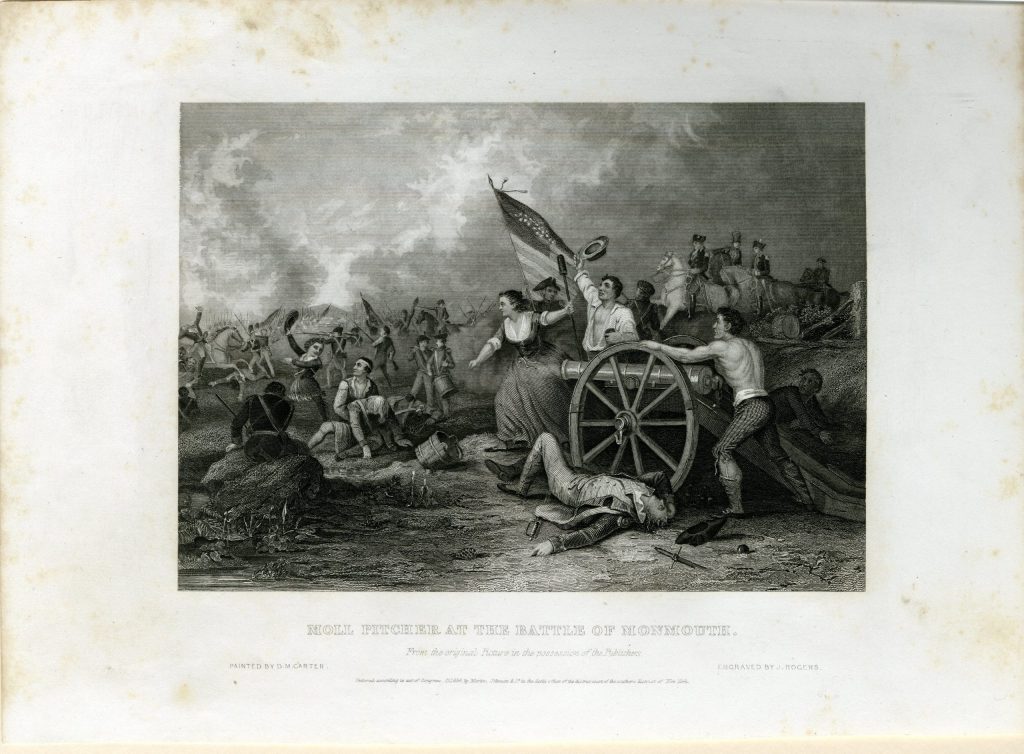
Moll Pitcher at the Battle of Monmouth
John Rogers, engraver; after D.M. Carter, artist
New York, 1856The Society of the Cincinnati
Battle scene with Molly Pitcher in the center assisting two solders fire a cannon next to an officer who lies mortally wounded. In the background to the right are a group of officers on horseback, the first of which appears to be George Washington.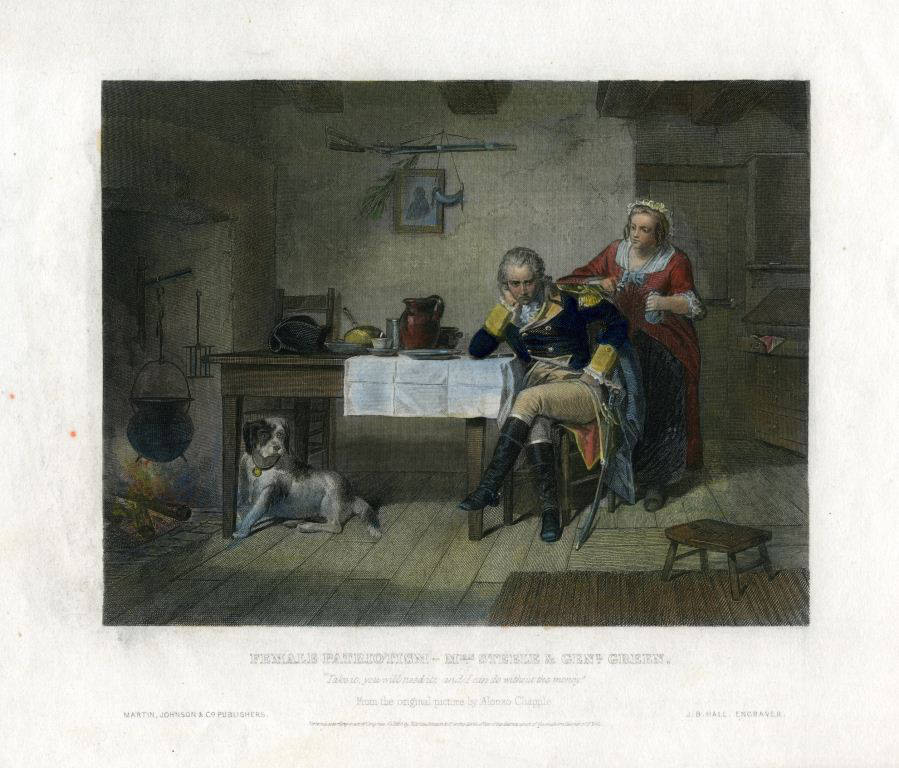
Female patriotism--Mrs. Steele & Genl. Green
Alonzo Chapple, artist, H.B. Hall, engraver
New York: Martin, Johnson & Co., c.1856The Society of the Cincinnati
General Nathanael Greene, in uniform, sits at the kitchen table looking despondent. Mrs. Steele is standing behind him holding a money bag. A dog lies near the fireplace where a kettle hangs over the fire. Under the title is the caption: Take it, you will need it, and I can do without the money.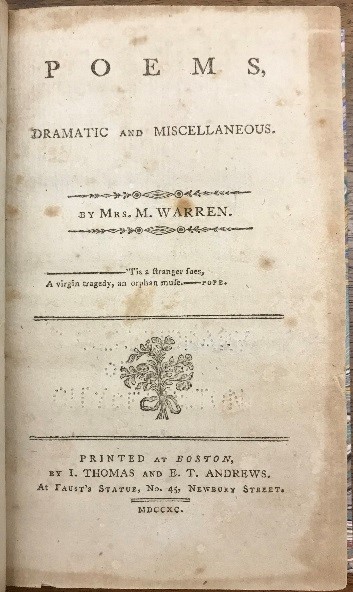
Poems, Dramatic and Miscellaneous
Mrs. M. Warren (Mercy Otis Warren)
Boston: I. Thomas and B.T. Andrews, 1790The Society of the Cincinnati
This work by the New England poet, playwright, and satirist, Mercy Otis Warren, reflects her experiences and perceptions during the Revolutionary War. Dedicated to "George Washington, President of the United States...one who has united all hearts in the field of conquest, in the lap of peace, and at the head of the government of the United States...But it must be a bold adventurer in the paths of literature, who dreams of fame, in any degree commensurate with the duration of laurels reaped by an hero, who has lead the armies of America to glory, victory and independence." Includes two plays (The Sack of Rome and The Ladies of Castile), the poem, The GENIUS of AMERICA, weeping the absurd FOLLIES of the DAY, October 10, 1778, and other allegorical and satirical works referencing the Revolutionary War.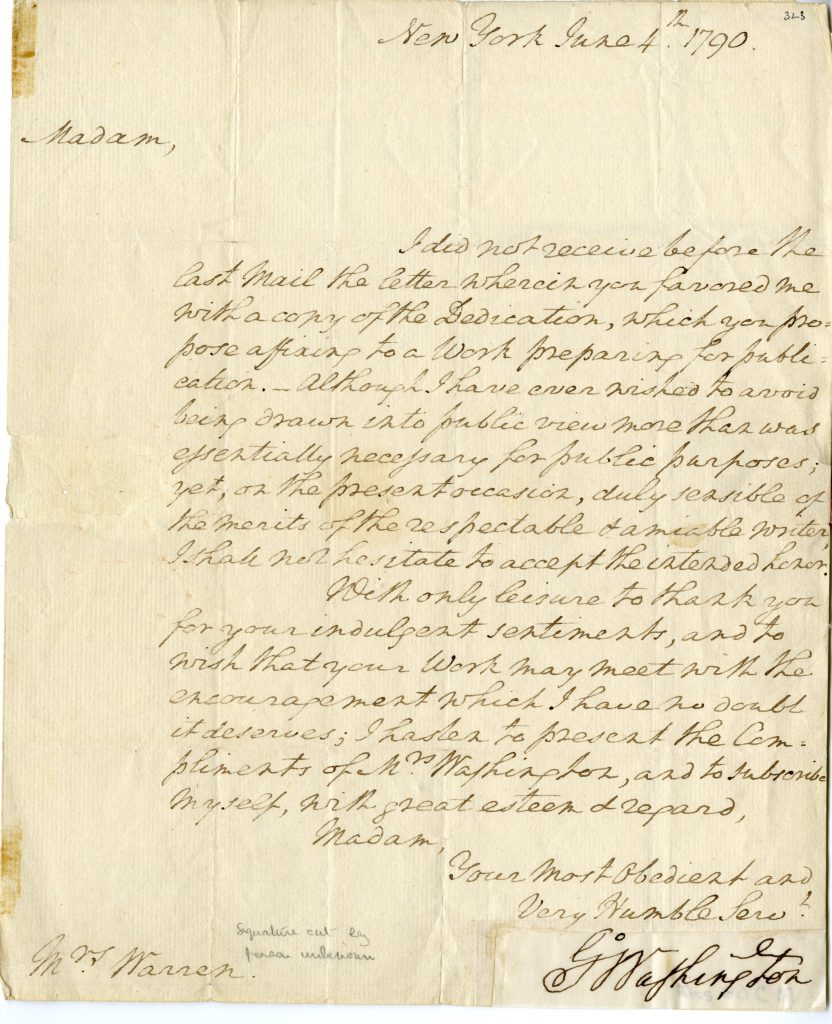
Letter to Mercy Otis WarrenGeorge Washington
June 4, 1790
The Society of the Cincinnati, gift of Charles Warren, 1947
In his letter, President Washington accepts Madam Warren's dedication of her book, Poems, Dramatic and Miscellaneous, in his honor, writing: "Though I have ever wished to avoid being drawn into public view more than was essentially necessary for public purposes yet, on the present occasion, duly sensible of the merits of the respectable and amiable writer, I shall not hesitate to accept the intended honor." Washington's signature was clipped, and is supplied in facsimile.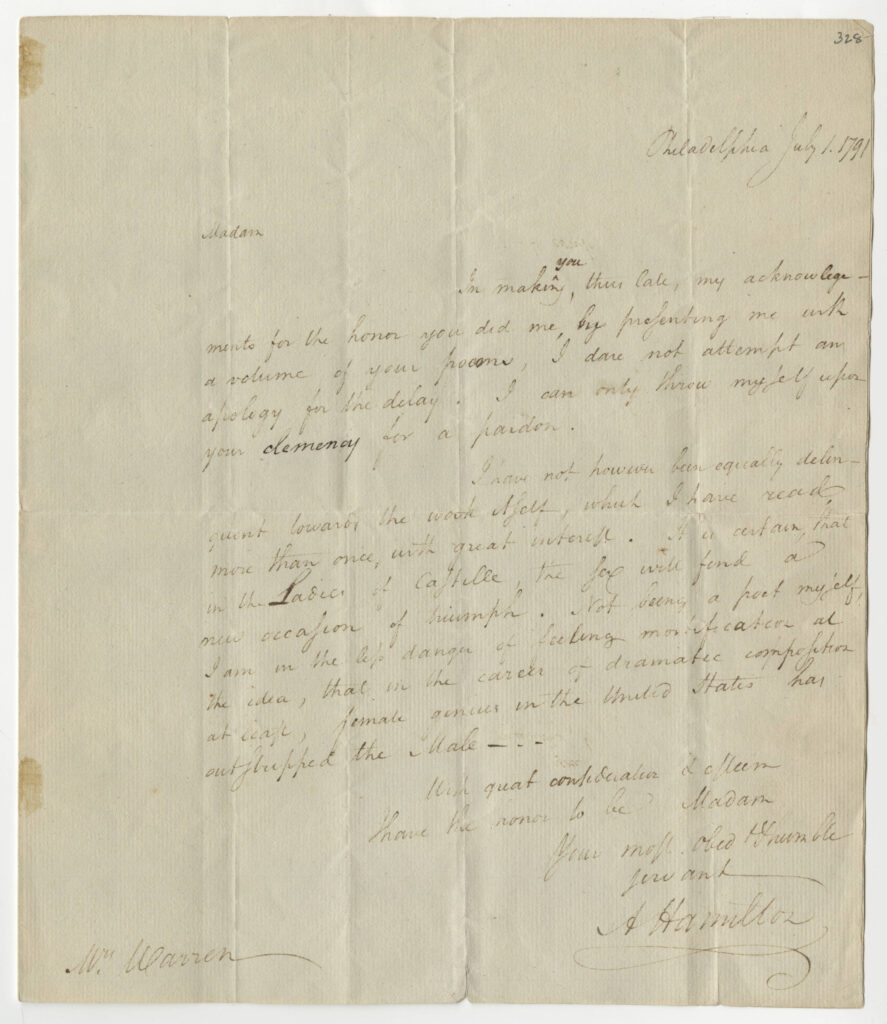
Letter to Mercy Otis WarrenAlexander Hamilton
July 1, 1791
The Society of the Cincinnati, gift of Charles Warren, 1947.
In his letter, Mr. Hamilton apologizes for his delay in acknowledging her gift book of poetry, Poems, Dramatic and Miscellaneous. He comments specifically on one of the dramatic works in the book, "The Ladies of Castille," writing, "It is certain that ...the sex will find a new occasion of triumph." He adds that "...in the career of dramatic composition at least, female genius in the United States has outstripped the male."(quoted in Ron Chernow's biography of Hamilton).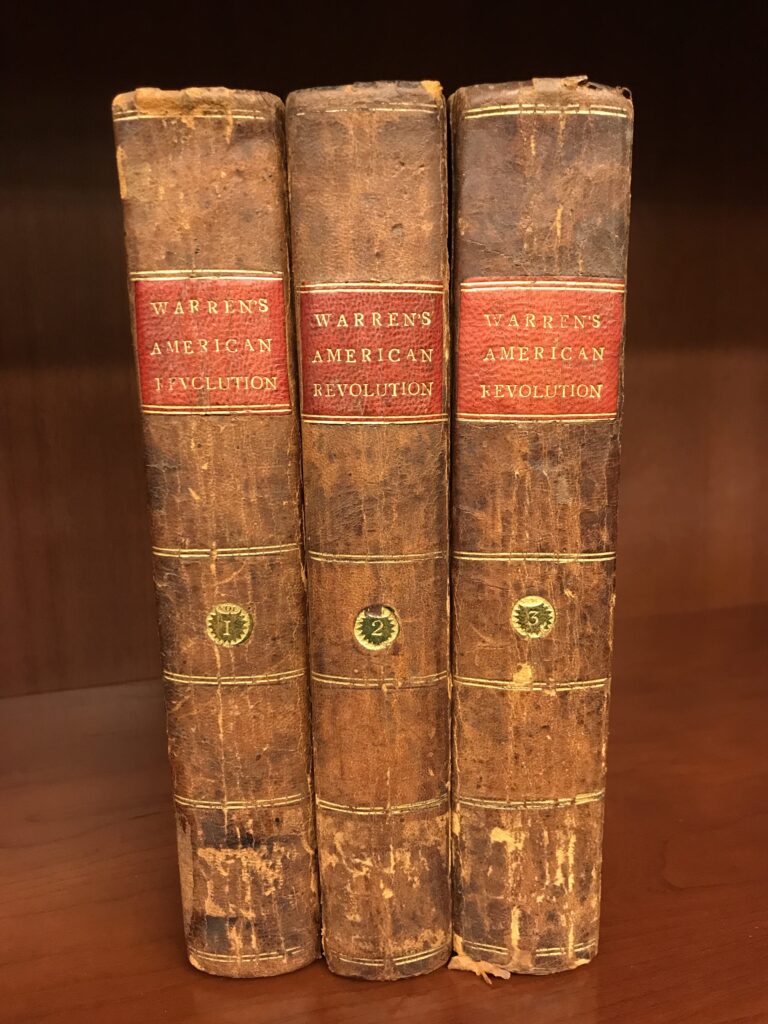
History of the Rise, Progress, and Termination of the American Revolution: interspersed with biographical, political and moral observations
Mrs. M. Warren (Mercy Otis Warren)
Boston: Printed by Manning and Loring, For E. Larkin, No. 47, Cornhill, 1805The Society of the Cincinnati
Mrs. Warren began penning her three-volume series on the history of the American Revolution from the outset of the conflict. Warren's History was among the first nonfiction books published by a woman in America.
Rachel Nellis, Research Services Librarian, The American Revolution Institute
March 18, 2022
Research Services Librarian Rachel Nellis discusses Mercy Otis Warren’s Poems, Dramatic and Miscellaneous, published in 1790, that contains two plays and several allegorical or satirical poems on the Revolution that were dedicated to George Washington and praised by Alexander Hamilton.
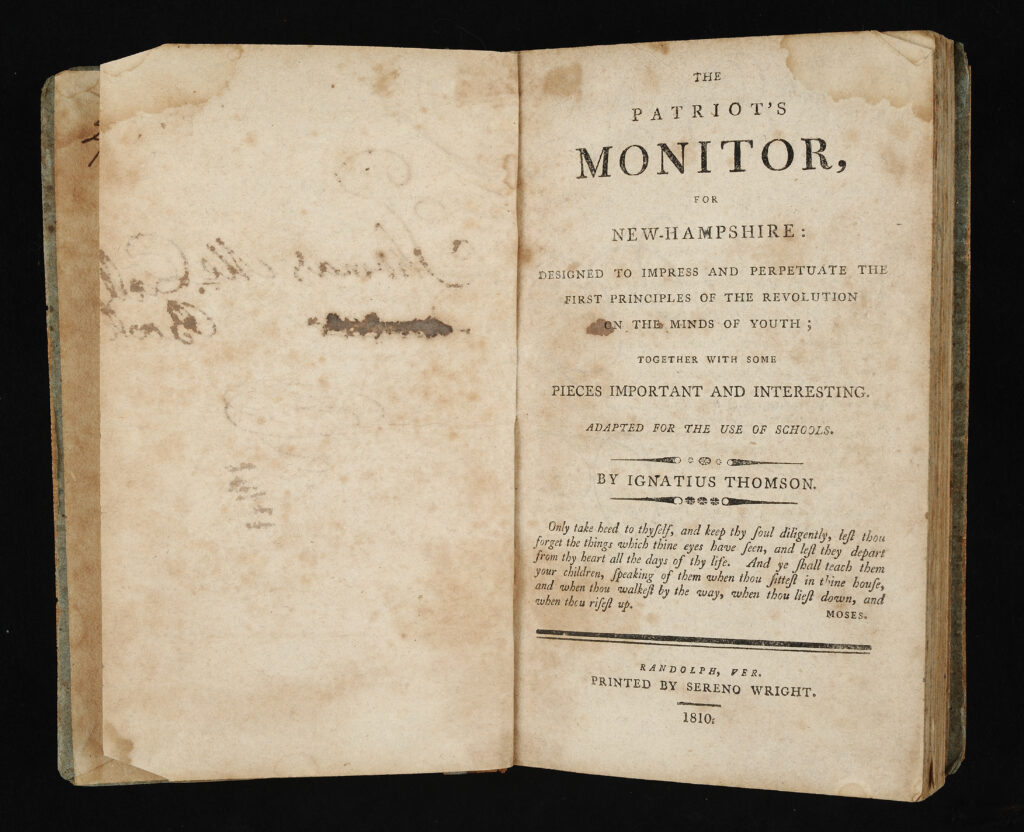
The Patriot's Monitor, for New-Hampshire: Designed to Impress and Perpetuate the First Principles of the Revolution on the Minds of Youth; together with Some Pieces Important and Interesting. Adapted for the Use of Schools
Ignatius Thomson
Randolph, Vermont: Sereno Wright, 1810The Society of the Cincinnati
This 1810 textbook “designed to impress and perpetuate the first principles of the Revolution on the minds of youth,” was compiled by the Rev. Ignatius Thomson of Pomfret, Vermont. He selected key documents of America’s founding, from the Declaration of Independence through the inaugural addresses of the first four presidents of the United States, along with other moral and patriotic lessons. Each paragraph of each text is numbered to facilitate recitation and reading aloud in a class.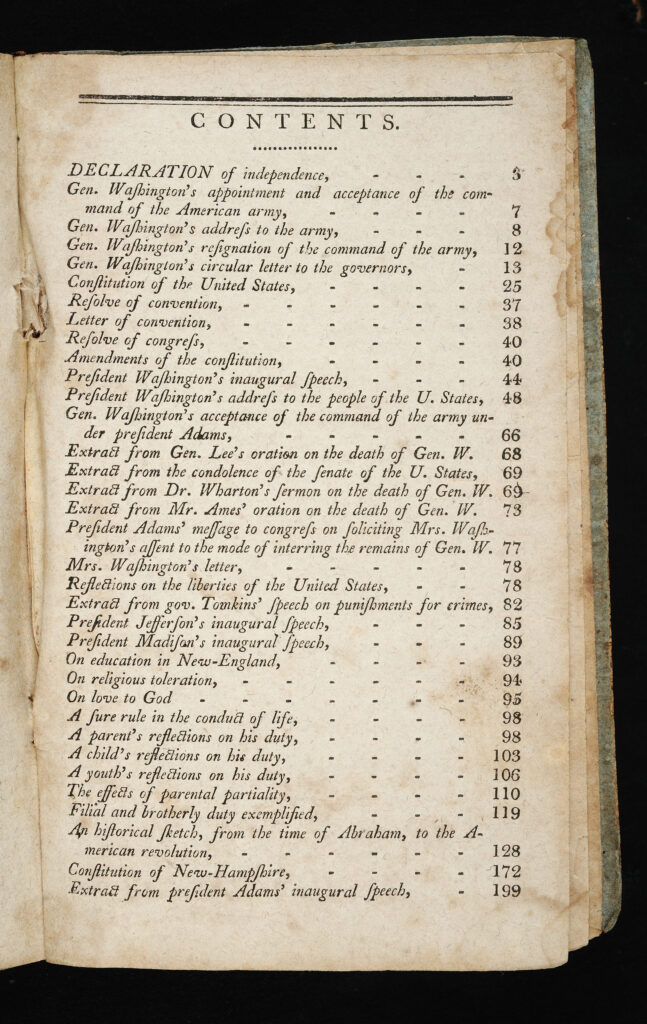
The Patriot's Monitor, for New-Hampshire: Designed to Impress and Perpetuate the First Principles of the Revolution on the Minds of Youth; together with Some Pieces Important and Interesting. Adapted for the Use of Schools
Ignatius Thomson
Randolph, Vermont: Sereno Wright, 1810The Society of the Cincinnati
George Washington’s central role in the achievement of American Independence is documented in the first five texts of the Patriot’s Monitor: “The Declaration of Independence” (p. 3-7); "General Washington's appointment and acceptance of the command of the American army" (p. 7-8); "General Washington's address to the army" (p. 8-12); "General Washington's resignation of the command of the army" (p. 12-13); and "General Washington's circular letter to the governors of the several states" (p. 13-24).download pdf version of presentation


